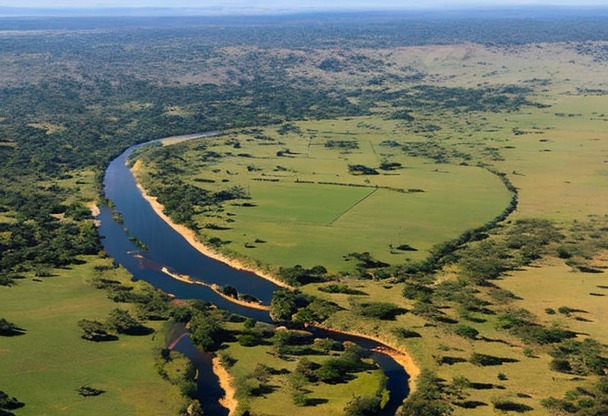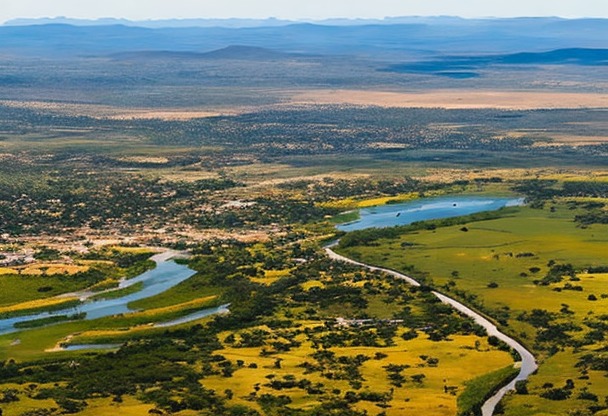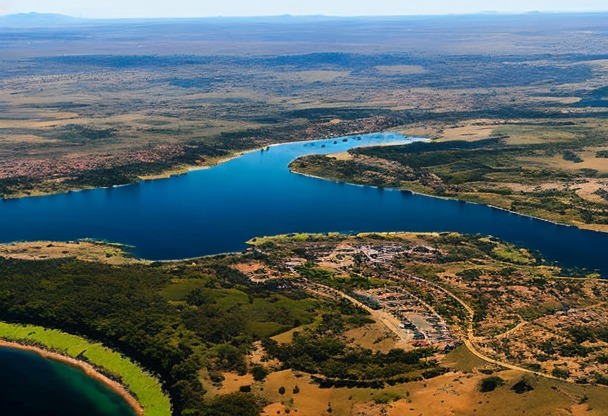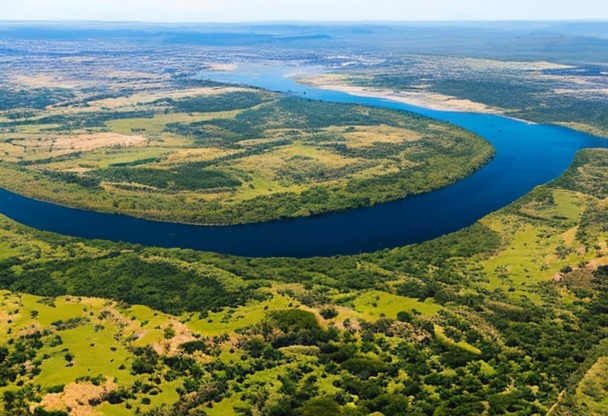WHEN TO TRAVEL TO Zimbabwe
Choosing the right time for your trip to Zimbabwe can make all the difference. It's important to consider climatic elements, seasonal events and peak tourist periods to maximize your travel experience.

Location
Climate
Temperatures and rainfall in Zimbabwe
Zimbabwe's climate is generally subtropical, with high temperatures moderate temperatures and rains vary from region to region. As the country lies on the high plateaustemperatures are generally cooler than in the surrounding plains.Dry and wet seasons
The best time to visit Zimbabwe depends largely on your climate preferences and the activities you wish to enjoy. There are two main seasons in Zimbabwe: summer and winter. dry season and the wet season.- Dry season (April to October) The months from April to October are considered the dry season in Zimbabwe. During this period, there is little rain, which makes the roads more passable and facilitates wildlife observation. Temperatures are generally pleasant during the day, but can be cool at night. This is also the best time to visit Victoria Falls, as the water flow is at its maximum.
- Wet season (November to March) From November to March, Zimbabwe experiences its rainy season. Rainfall can be abundant, especially in mountainous regions. Although this can make some activities more difficult, the wet season also offers lush, green landscapes. Temperatures are generally higher during this period, with high humidity.
Major cultural events in Zimbabwe
Zimbabwe has a rich culture and history, and many events and festivals celebrate this unique heritage. Taking part in these events can be a great way to discover the local culture and enjoy an authentic experience during your trip.Harare International Film Festival (HIFF)
This annual festival is held in July and features films from Zimbabwe as well as other African and international countries. The event aims to promote the local film industry and encourage collaboration between Zimbabwean filmmakers and their foreign counterparts.Harare International Arts Festival (HIFA)
HIFA is a annual six-day festival held in April or May, which celebrates the visual arts, music, theater, dance and literature. The event brings together local and international artists and attracts thousands of visitors every year. It's an excellent opportunity for tourists to discover Zimbabwe's artistic talent and appreciate the different art forms on display.Zimbabwe Culture Week
Celebrated every May, Zimbabwe Culture Week aims to promote and preserve the country's rich culture and heritage. Festivities include art exhibitions, traditional music and dance performances, and workshops on Zimbabwe's history and culture.Public holidays in Zimbabwe
There are several national holidays in Zimbabwe, and although they are mainly celebrated by the locals, they can also offer tourists an interesting insight into local traditions.- Independence Day (April 18) Zimbabwe Day: This day commemorates Zimbabwe's independence from the United Kingdom in 1980. Parades and celebrations take place throughout the country.
- Labour Day (May 1) As in many other countries, Labour Day is celebrated on 1 January.er May in Zimbabwe. It's a public holiday for workers and an opportunity for many to organize picnics and family outings.
- Heroes' Day (second Monday in August) Heroes' Day: Heroes' Day pays tribute to those who fought for Zimbabwe's independence. Commemorative ceremonies are held throughout the country.
- Unity Day (December 22) Zimbabwe Day: This day celebrates the unity between Zimbabwe's different ethnic and cultural groups, as well as the agreement signed between two major political parties in 1987.
Low and high tourist season periods
Finally, it's important to take into account the low and high season periods when planning your trip to Zimbabwe.- High season (June to October) The high season coincides with the dry season, when weather conditions are most favorable for outdoor activities. During this period, expect higher accommodation rates and more tourists at popular attractions.
- Low season (November to April) If you prefer to avoid the crowds and benefit from lower rates, low season could be the best time for you. However, bear in mind that some activities and attractions may be limited due to weather conditions.
Insurance

Your credit card does not cover you in all situations, that is whyIt is essential to take out insurance before you leave to avoid any unpleasant surprises. If you need to see a doctor or be hospitalized, in some countries, medical costs are very high and you will then find yourself having to pay several thousand euros.
Our partner Chapka Insurance proposes the contract CAP ASSISTANCE 24/24 with many essential guarantees.


Flights

Your flight has been cancelled or delayed ?
You may be eligible for a compensation of up to €600 ! For this, lawyers are responsible for handling your claim with the airline and are only paid when the reimbursement is effective.
In conclusion, no financial risk for you, only advantages!
Statistics on international tourism in Zimbabwe
The tourism sector plays a major role in the Zimbabwean economy, contributing around 10% to the country's GDP. According to figures published by the World Tourism Organization, Zimbabwe welcomed nearly 2.5 million international visitors in 2019, an increase of 7% on the previous year. These visitors included:- Tourists come to discover the country's natural wonders, such as Victoria Falls or Hwange National Park.
- Business travelers attending conferences and professional events
- Visitors visiting family or friends
Statistics on net migration in Zimbabwe
In addition to tourism, Zimbabwe also experiences significant migration. Net migration refers to the difference between the number of people entering a country and those leaving. According to data published by the World Bank, net migration in Zimbabwe was -4.1 per 1,000 inhabitants in 2019, meaning that the country lost more inhabitants than it gained that year. This situation is explained in particular by the economic and political difficulties that Zimbabwe has been facing for several years. As a result, many Zimbabweans are choosing to emigrate in search of better employment and living opportunities abroad, mainly in neighboring countries such as the Democratic Republic of the Congo.South Africa and the Botswana.The main reasons for Zimbabwean migration
Several factors may explain the trend towards emigration in Zimbabwe:- High unemployment and weak economic growth
- Deteriorating living conditions and public services
- Lack of political stability and social tensions
- Natural disasters, such as droughts and floods, which affect agriculture and food security
Statistics on asylum applications in Zimbabwe
In addition to economic migrants, Zimbabwe also hosts a significant number of refugees and asylum seekers. According to United Nations High Commissioner for Refugees (UNHCR), there will be around 20,000 refugees and asylum seekers in Zimbabwe by 2020. The majority of these people come from neighboring countries such as the Democratic Republic of the Congo, the Democratic Republic of the Congo and the Democratic Republic of the Congo. Mozambique or the Burundi. The reasons why these individuals seek refuge in Zimbabwe vary, but often include :- Armed conflict and violence in their home countries
- Political or religious persecution
- Natural disasters or humanitarian crises
The challenges of receiving refugees and asylum seekers in Zimbabwe
Although the Zimbabwean government is committed to offering protection and support to refugees and asylum seekers, there are several challenges to overcome. These include:- Lack of resources and infrastructure to accommodate large numbers of displaced people
- The difficulty of integrating refugees into Zimbabwean society, particularly in terms of access to education, employment and health services.
- Tensions between local communities and refugee populations, sometimes due to competition for limited resources
Most popular visas in Zimbabwe
To enter and stay in Zimbabwe, foreign nationals generally need to apply for a visa. The most commonly requested visa types include :- THE tourist visavalid for up to three months, which allows the holder to visit the country for tourism purposes only.
- THE business visafor travellers taking part in business activities such as meetings, conferences or training courses
- THE work visagranted to people who have obtained a job offer from a Zimbabwean employer
- THE student visafor foreign students wishing to study in Zimbabwe


